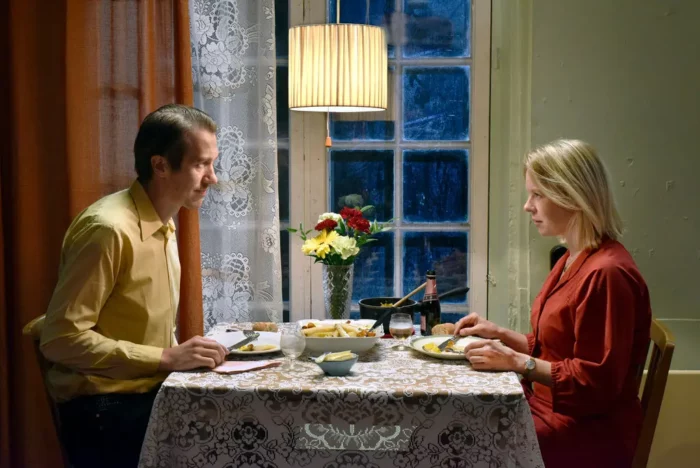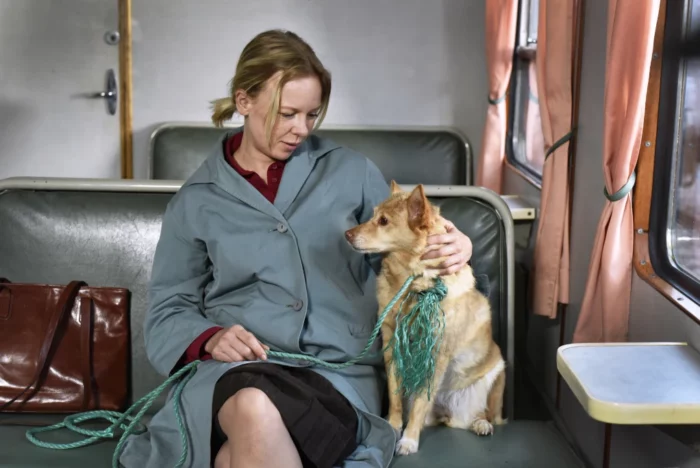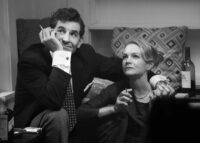Love blossoms in a Kafkaesque world in Aki Kaurismäki’s latest film, Fallen Leaves. The story is about two blue-collar workers living in present day Helsinki, Finland. Ansa (Alma Pöysti) is a supermarket assistant battling loneliness, and Holappa (Jussi Vatanen) is a construction worker battling alcoholism. Both live in a quite ruthless urban setting where their highly pressured work environment demands zero-hours contracts, employers are hypocritical and can be downright corrupt, and employees can be fired for any minor infraction. Both are also living in poverty, or verging on it, and to add to the general depression, the radio broadcasts news of the war between Russia and Ukraine, disturbing the peace and increasingly further the general discomfort. The only fun in Ansa and Holappa’s lives seems to be a weekly trip to a local karaoke bar, where the two meet for the first time.
It is on this background of one unkind world that undermines the human spirit that Kaurismäki desires to ignite a spark of love between these two lost souls who start to develop an intimate connection amidst the general grimness of their everyday existence. This contrast works wonders in the film, and Aki Kaurismäki proceeds to unfold his romance delicately, going for restrained expressions of interest, shy glances and awkwardness in interaction. The duo locks their eyes on each other for the first time as a version of Franz Schubert’s Serenade is being sung in a karaoke bar, but because both are rather proud, their romance will not be so straightforward. Being so downtrodden, Ansa and Holappa are already highly sympathetic people in our eyes, and their curious interest in each other only makes us pine for their happiness more.

Fallen Leaves is set in the modern day, but because Kaurismäki uses the 1970s aesthetics, especially in the choice of colour, fashion and music, the story quickly transports us to some bygone era, and the old fashioned-style romance between Ansa and Holappa only heightens this perception of this film being a nostalgic throwback to some earlier times. This gives the film yet another peculiar quality (apart from its Kafkaesque setting), which is also in line with the director’s previous work. Kaurismäki never imposes his cinematic vision on the viewer, and, as we take each frame as it comes, when relief or surprise does come, they almost seem to be the products of our own volition. Holappa is clearly a very troubled man, but, just possibly, his newly-found connection with Ansa would set him on the right path, giving him the impetus to overcome his drinking vice.
The film also leaves clues, signs or hints scattered throughout the story, perhaps like autumn leaves to be “picked up” by the audience or not. So, there is a Brief Encounter film poster seen as Ansa and Holappa exchange their goodbyes after leaving the town’s cinema theatre, which also hints at their own “brief encounter”, and a Pierrot le Fou poster can also be spotted in one scene where Holappa is standing near the theatre, feeling foolish for having lost that piece of paper on which Ansa wrote her phone number.

Alma Pöysti and Jussi Vatanen give noteworthy performances as Ansa and Holappa who seem to be the only people in this story who behave like real people, rather than some robotic counterparts, as the deadpan delivery of many lines is reminiscent of Bressonian (and now also Lanthimosian) techniques, and it is this presentation which also helps to inject much humour, largely situational, into this picture. At one point, Ansa and Holappa watch Jim Jarmusch’s The Dead Don’t Die, a film about zombies, which is yet another obvious parallel to their zombie-like environment. The film’s second half feels rather underwhelming in comparison to the strong beginning, but this is perhaps because we already sense a rather predictable finale.
With a lifetime of directing experience and an already formed distinct style, Aki Kaurismäki is comfortably positioned to make Fallen Leaves, a film he made after the announcement of his retirement, a success. And, Fallen Leaves certainly feels measured and accomplished. Similar to the director’s other notable films about ordinary people, such The Match Factory Girl and Drifting Clouds, the achievement here is dramatising such a simple, even unpromising, story of everyday romance so coolly, and with so much charm. Fallen Leaves combines the seemingly uncombinable as it elicits many smiles, tugs at the heartstrings, and inspires awe at the sheer elegance and simplicity of the cinematic craftsmanship on display.




